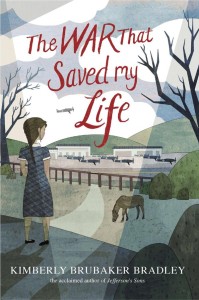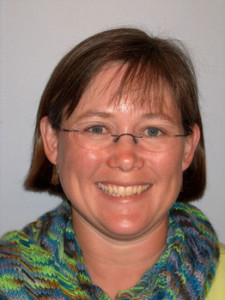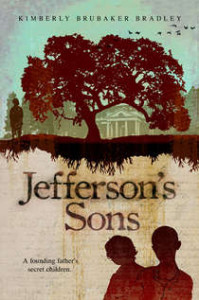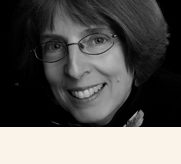 Last week, Kimberly Brubaker Bradley won the Newbery Honor Award for her middle grade novel, The War that Saved my Life, and just this week she’s learned that it’s hitting the New York Times bestseller list. The book was also a co-winner of the Schneider Family Book Award, and the audio version won the Odyssey. Wow. Congratulations, Kim!
Last week, Kimberly Brubaker Bradley won the Newbery Honor Award for her middle grade novel, The War that Saved my Life, and just this week she’s learned that it’s hitting the New York Times bestseller list. The book was also a co-winner of the Schneider Family Book Award, and the audio version won the Odyssey. Wow. Congratulations, Kim!
Kim and I “met” online after she blurbed Brotherhood (her lovely words appear on my book jacket and on the Brotherhood page of my website), and I was thrilled when she agreed to carve out time for this blog interview.
A.B. Westrick: Welcome, Kim! I loved reading The War that Saved my Life, and wanted to ask for your reflections on the craft of writing.
Kimberly Brubaker Bradley: So glad to appear on your blog! Thank you for asking.
ABW: Let’s get right to the heart of The War that Saved my Life. Set in England at the start of WWII, it’s the story of ten year-old Ada, who was born with a clubfoot and whose abusive mother has tried to keep her hidden. As world events compel Ada out into the world, she must struggle both to understand all that she’s missed and to heal from the trauma of abuse. My first question is: how did you go about crafting Ada’s voice, so British and so real?
KBB: Anne, I’ll be honest, Ada’s voice was far and away the hardest thing for me to get right. I wrote the first few chapters over and over again, sometimes in first person, sometimes in third. Eventually I realized that I needed to be telling her story at a little bit of a time remove, so that she could describe all the things she didn’t know or understand, but have a vocabulary that included those things. You can see that on the third page: “The story I’m telling starts out four years ago, at the beginning of the summer of 1939…” We’re not getting a grownup telling the story, but we’re not getting ten-year-old Ada’s voice, either. As far as the British—I read so many stories published or set in England as a child that my vocabulary still contains words that puzzle Americans.
ABW: The re-writing clearly paid off. Lines like “I was ten years old (though I didn’t know my age at the time),” and later, “It was a pear, though we didn’t know it then,” made me curious. Why wouldn’t she know? (I had to keep turning pages.) And the British vocab was great—words like cheeky, and all that tea! I loved the way the story took me into another world, another time.
In your blog and in a post on School Library Journal’s Teen Librarian Toolbox, you discuss how your own experience of PTSD influenced the way you crafted your protagonist. Clearly, you pulled from your past a sense of resilience and infused Ada with it. For you, how cathartic was the experience of writing Ada’s story? What words of wisdom do you have for writers who’ve survived tough circumstances and are considering tapping into those memories to bring their fiction to life?
 KBB: I didn’t think it was going to be cathartic—I went to pretty great lengths to have the specifics of Ada’s situation be very different from mine, and to have her reactions and life dissimilar to mine. But in the end it was more healing that I expected. I don’t think I could have written this book until I’d come pretty well to terms with my past. I had to write it from a place of healing.
KBB: I didn’t think it was going to be cathartic—I went to pretty great lengths to have the specifics of Ada’s situation be very different from mine, and to have her reactions and life dissimilar to mine. But in the end it was more healing that I expected. I don’t think I could have written this book until I’d come pretty well to terms with my past. I had to write it from a place of healing.
Healing from any trauma is a long, drawn-out process, and I couldn’t have written this book when I was still experiencing a lot of personal pain. It’s very tempting to want to use our lives as material, but I wouldn’t have been able to use the material very effectively before this. It may have impeded my own healing. That said, I think every person is unique; I’m not sure I can offer anyone advice on their own journey except to say that the journey is possible, and worth it.
ABW: I really appreciate your honesty in talking about tough personal stuff. I can imagine that some readers will find Ada’s story so empowering that they’ll seek help for their own journeys. Ada’s determination is inspiring.
We’ve all heard the adage, write what you know, and I love how you took what you know well—both PTSD and horses—and used that knowledge to give depth to the story. But I’m also interested in what you didn’t know. Can you talk a bit about the research you did to make Ada’s story come alive? Tell us about your process in doing research.
KBB: In this case, I was enormously helped by Amazon.uk, the British version of Amazon.com. In England a ton of former evacuees have written and published accounts of their experiences; also, because this is taught extensively in British schools, they sell a ton of facsimiles of printed war materials. That was a good start. Eventually, however, I realized I was going to have to see Kent with my own eyes in order to be able to describe it through Ada’s.
In 2012 my family spent our children’s spring break in England. Highlights included the Imperial War Museum, where I could see actual Spitfires, boats that helped with the Dunkirk evacuations, bombs, identity cards, rations books, an Anderson shelter—all the stuff—and then driving around Kent, getting completely lost in back roads, and stumbling across the remains of one of the hundreds of airfields thrown up in England during the war. I also climbed to the top of Ada’s hill and looked out at the sea.
ABW: Sounds like a fabulous trip. While reading, I paused when Ada paused on that hill and looked out at the sea. In my mind, I could see it, too—that’s how caught up I was in the story.
I know you’re super busy, so I’ll wrap this up by asking how long it took you to write The War that Saved my Life? How many revisions did the manuscript go through?
 KBB: I’m guessing about 2 1/2 years—I say guessing because I was starting the research while still finishing Jefferson’s Sons. The initial chapters went through about six revisions before I found Ada’s voice; after that, the entire manuscript went through six full revisions before copyediting. It’s the most-revised book I’ve ever written—and worth it.
KBB: I’m guessing about 2 1/2 years—I say guessing because I was starting the research while still finishing Jefferson’s Sons. The initial chapters went through about six revisions before I found Ada’s voice; after that, the entire manuscript went through six full revisions before copyediting. It’s the most-revised book I’ve ever written—and worth it.
ABW: Yes, very worth it! Thank you so much for this e-interview, Kim. I look forward to reading all of your books.
KBB; Thanks, Anne! I’m looking forward to your next book, too!
For more information about Kimberly Brubaker Bradley (she’s the author of 16 books for young readers, including the highly acclaimed Jefferson’s Sons, and For Freedom: the Story of a French Spy), check out her website and blog.

This sounds like a magnificent novel! I just added it to my need-to-read list. I recently read Jefferson’s Sons, which I absolutely admired. This interview gave me a lot of hope. She obviously puts a lot of hard work and effort into her novels, and it certainly pays off! Congratulations to Kimberly Brubaker Bradley! Hopefully one day, once I finish my novel (going on two years in the making in March) I may receive successful results too! Thank you for this wonderful article! 🙂
I read Jefferson’s Sons a couple of years ago, and to this day I find myself thinking about parts of that book–especially the chapter where the son returns home because he’s not prepared to answer the question about who his people are. It hadn’t occurred to me that such a question might be so hard to answer, not simply because he was one of Jefferson’s sons, but also because the question wasn’t asked in African-American communities. It made me think a whole lot about history, about what we know and don’t know, what we ask and what we don’t. Bradley knows how to write a novel that digs deeply into subjects that aren’t easily and openly discussed.
Kudos to you for nearing the 2-year mark on your novel! I spent 3 years writing my most recent novel, and it’s now out on submission. (Fingers crossed that in 2016 I will get a contract on it.)
Thank you! I wish you the best of luck on getting a contract. 😀